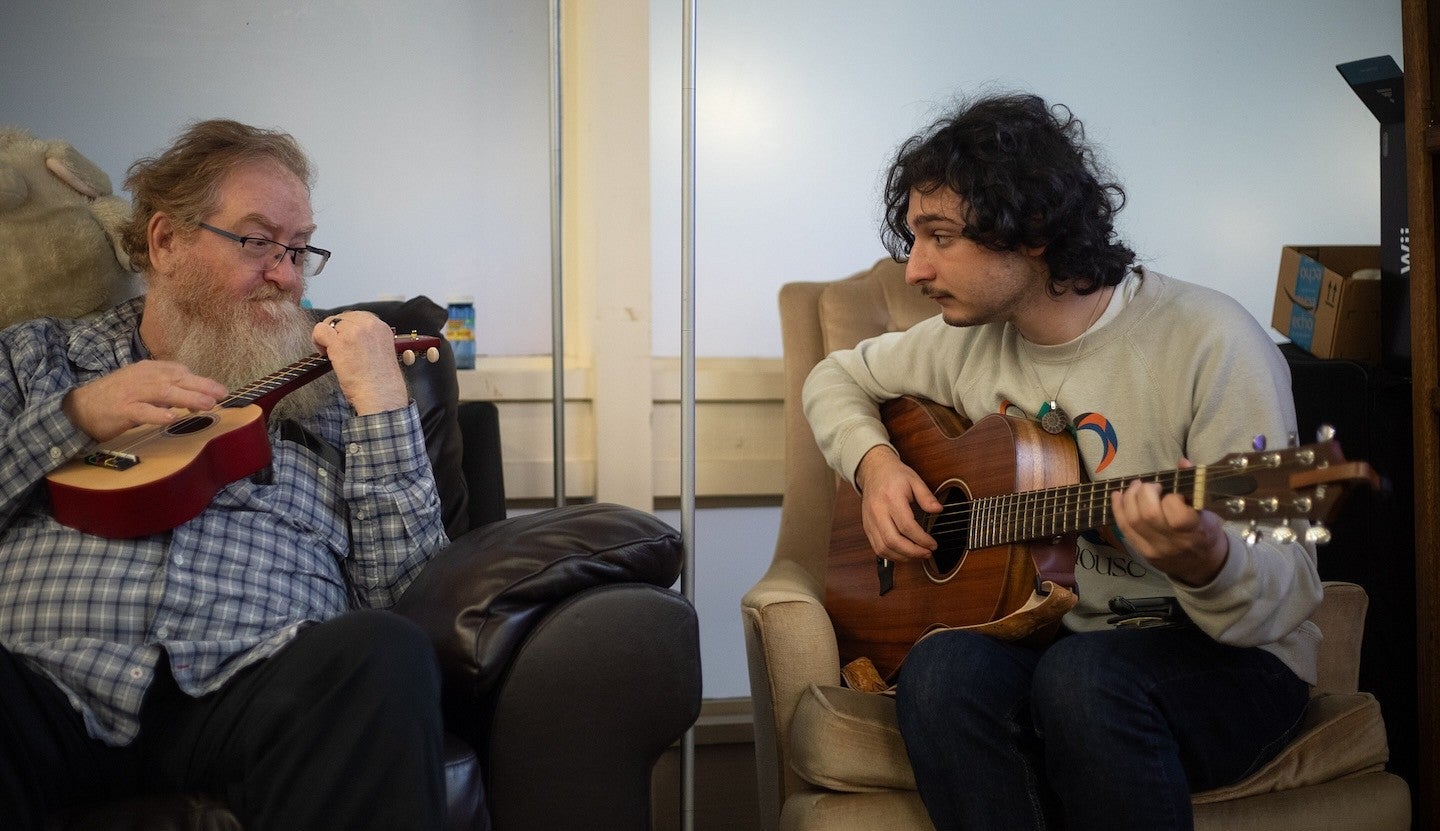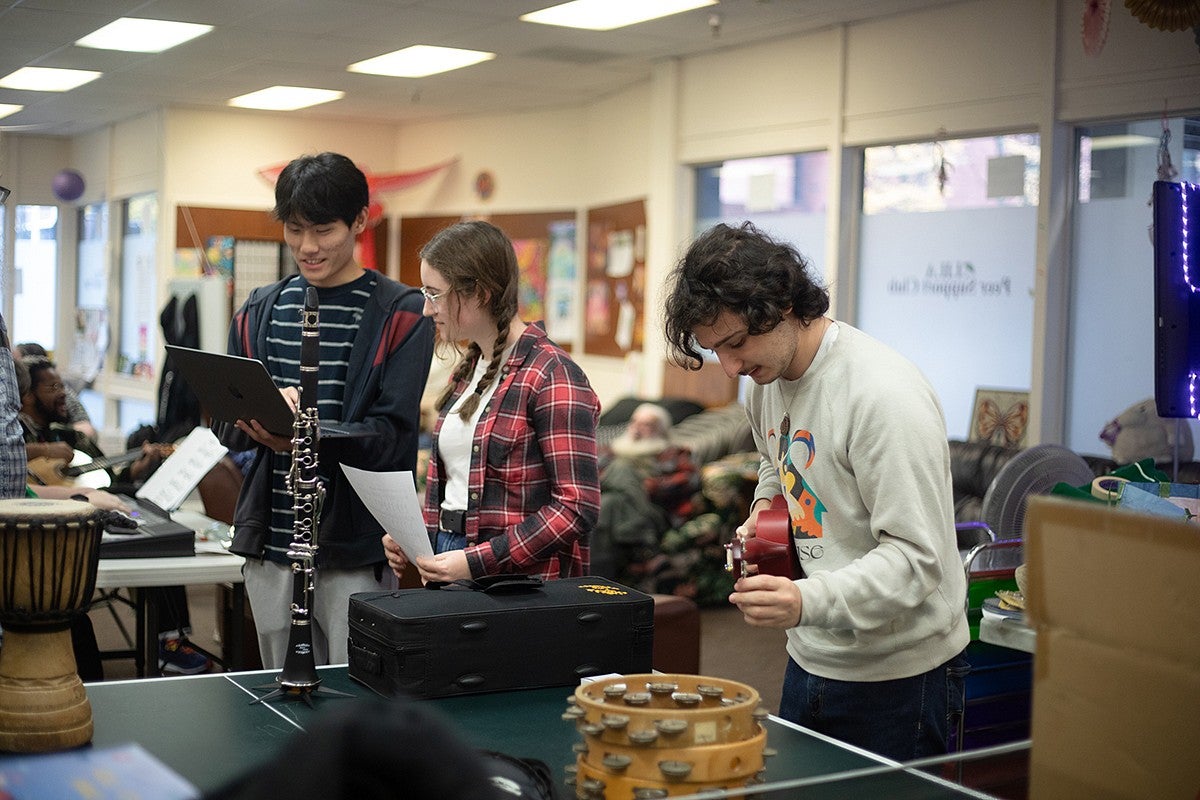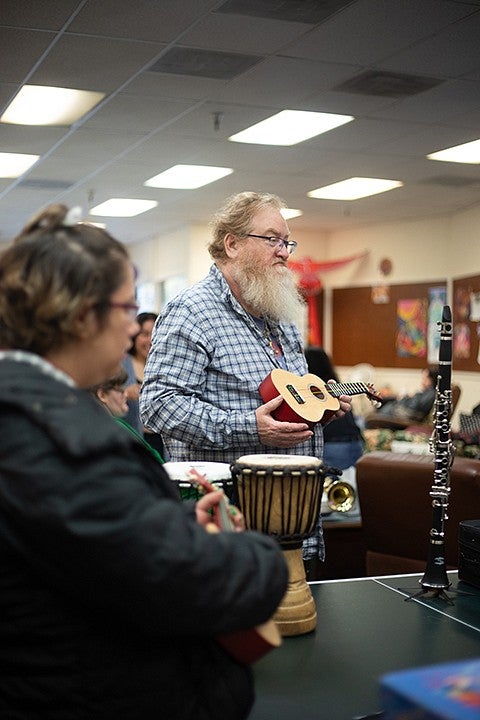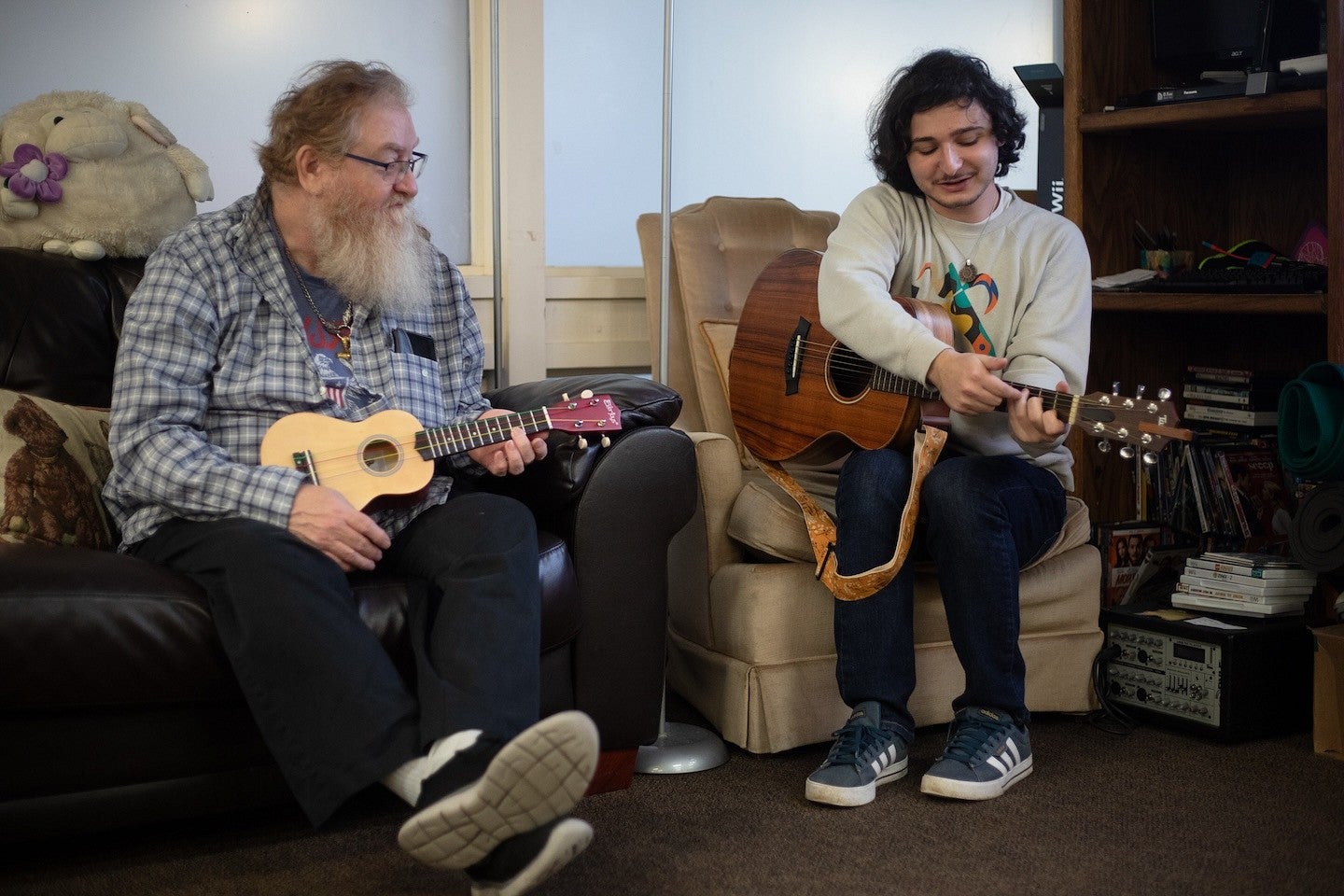Filling the gap with music

Hear an audio story about We the Ensemble:
For more information or to get involved:
Send an email to Micah Primack at uowtensemble@gmail.com.
Inside the Lane Independent Living Alliance peer center, a framed poster hangs on a wall with a quote from former First Lady Eleanor Roosevelt that reads: “No one can make you feel inferior without your consent.”
Its meaning is on full display twice a month during the UO academic year as Clark Honors College junior Micah Primack leads a group from the university called “We the Ensemble,” a club that advocates for teaching music to people with disabilities in the Eugene area.
The peer center in downtown Eugene is their classroom. One side of a community room is filled with comfortable furniture and art as Primack, the group’s president, patiently guides ukulele players through their finger movements.
Nearby, one of the music enthusiasts plays a song unaccompanied on the piano. When the song ends, the room erupts in applause.

Primack has been one of the driving forces of the club for two years, helping people who haven’t been able to access music education in their lives. He works closely with five other UO students who volunteer regularly at the social service organization.
“There’ve been a lot of studies and research done about how we can use music to help engage people with their emotions and feelings. Music is an extremely powerful tool. Communities that have been underrepresented are not reaping (some of the) benefits of music education.”
A Stamps Scholar, Primack is double majoring in psychology and music. He wants to pursue a career in music therapy because he believes in the healing power of song. People with disabilities face a variety of institutional barriers and the ensemble club helps lessen those hurdles, he says.
Music lessons can be expensive, and not too many people with modest incomes can afford it. “There’ve been a lot of studies and research done about how we can use music to help engage people with their emotions and feelings,” he says. “Music is an extremely powerful tool. Communities that have been underrepresented are not reaping (some of the) benefits of music education.”
Music as a tool
Primack worked with another student from the Clark Honors College when he first arrived at UO to turn the idea for a club into a reality. They sought out volunteers and came up with ways to share a love of music.

Members of We the Ensemble volunteer their time at the peer center and serve people with physical, mental, cognitive and sensory disabilities from across Lane County.
They plan lessons on music theory and provide instruments so community members can practice. With music as the tool, the group’s mission aligns with the alliance’s goal of providing a safe space that leads to personal growth.
Scott Lemons, the alliance’s program coordinator and peer support specialist, says organizations like We the Ensemble encourage people with disabilities to participate in their own communities.
“People with disabilities can feel really isolated and like the community does not care about them in so many ways,” Lemons says. “To have the students work with our members and to always have smiles on their faces makes them feel like the greater community of Eugene really cares about them. (We The Ensemble) has given them a lot of inspiration to get out there more.”
Primack learned from his father how to play growing up in his home state of Pennsylvania before moving to Arkansas. His dad composed music and played several instruments, which led to Primack picking up the guitar when he was 9. He learned music theory and composition, and taught himself other instruments.
His parents split up before he arrived at UO, which took a toll on his mental health. But he was able to recover, he says, by listening to compassionate lyrics and playing in a band. The experience helped him process his emotions during the difficult time.
Since then, he's made headway on other areas of music, including recently releasing an album with his band called “Belltower” on Spotify.
At the peer center, he encourages the students to play in a group rather than teaching them one-on-one. “One of our goals for the club is to get people to play together,” Primack says.

It's important to the group's organizers that students to make their own decisions about music. That's because they don't want to set limitations on how people with different abilities learn. Teaching music, they say, has to help level the playing field for others.
Celebrating growth together
Charlotte Curtis learned how to play a song on the piano, choosing the theme from the movie “Star Wars” because she is a fan. Curtis says she took a community college piano course but ended up failing it twice. Learning how to play the piano as part of “We the Ensemble” has helped her overcome personal barriers.
“My favorite part about (the ensemble) has been meeting them and having them help me understand certain things in music that I’ve never known,” she says. “With my learning disability, it's really hard for me to understand certain things, and I can’t read sheet music. Here, they bring me sheet music with chords that I can actually play instead of having me figure out everything by myself.”
Curtis bought her own piano and has spent time practicing, working with peers at the alliance and organizing times to play together.
Lemons says noticed a change in Curtis. “She saw that she was capable of not only playing instruments but also helping people and is now much more participatory and supportive,” he says.
For Primack, working with a team of UO students makes the effort that much more enjoyable. “Our team is really amazing,” he says. “We work hard to recruit students and volunteers, and we offer a wide range of instrumental expertise. I’m really proud of how everyone in the club is stepping up and working toward forming that sense of community.”
Primack also participates in other activities. He likes sitting with his guitar and strumming chords, playing and singing vocals in his band, and he's worked in the past as a design editor for a campus literary magazine.
His team wants to see the ensemble grow and say recruiting more student teachers is a priority. “It’s vital that you know who and what you’re playing for,” he says. “I’m really looking forward to getting everyone on the same level where they have the ability to mesh together.”
